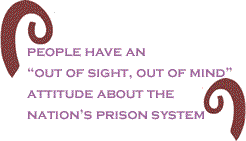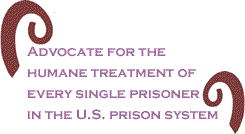|  From
the moment that PFC Bradley Manning was taken into custody
by military law enforcement officers, he has been subjected
to what is widely described as torture: solidarity confinement
with nearly total isolation from other human beings, possible
sleep deprivation, and deprivation of most mental stimuli
that would be considered necessary for a normal life. From
the moment that PFC Bradley Manning was taken into custody
by military law enforcement officers, he has been subjected
to what is widely described as torture: solidarity confinement
with nearly total isolation from other human beings, possible
sleep deprivation, and deprivation of most mental stimuli
that would be considered necessary for a normal life.
Manning
is the enlisted man who is charged with passing thousands
of government documents to Wikileaks, which has made them
public, much to the embarrassment of officials in the U.S.
and around the world. Although some officials have said
that he has �endangered American lives,� there have been
few disclosures of the specific dangers.
In
a country that prides itself on the principle that everyone
is presumed innocent until proven guilty, Manning has been
subjected to what has in the past been considered by some
courts, at least, to be cruel and unusual punishment - before
there have been any formal and public proceedings. The U.S. government is holding him as a national security
threat, much as it has any number of �enemy combatants.�
Of
course, military justice and the judicial system that we
are all somewhat familiar with are two different things.
In some aspects, though, they are not all that different,
but that depends on several things. In the military, there
is a code of military justice and, for the most part a service
member doesn�t have access to the justice system of the
larger society. In that larger system, justice depends on
several things: how much disposable money one has for his
or her defense, the social status of the defendant, the
race or caste of the defendant, and the ability to make
bail.
For
the most part, except in some cases, it is possible to get
bailed out while the case is running through the �system,�
but, again, that is a function of how much money the defendant
can raise for cash bail or for a bond.
 In
Manning�s case, there was no such opportunity and there
likely will be none. What is very different in his case
is that he was punished from the moment he was locked up.
It is widely considered in the mental health community that
solitary confinement, itself, is cruel and unusual punishment
and some consider it torture. He and his supporters consider
him to be a whistleblower, in the manner of Daniel Ellsberg,
who released the Pentagon Papers nearly four decades ago,
during the Vietnam War. In
Manning�s case, there was no such opportunity and there
likely will be none. What is very different in his case
is that he was punished from the moment he was locked up.
It is widely considered in the mental health community that
solitary confinement, itself, is cruel and unusual punishment
and some consider it torture. He and his supporters consider
him to be a whistleblower, in the manner of Daniel Ellsberg,
who released the Pentagon Papers nearly four decades ago,
during the Vietnam War.
Psychologists
for Social Responsibility (PsySR) sent an open letter on
Jan. 3, 2011, to Secretary of Defense Robert Gates, expressing
their concern about the mental health of PFC Manning and
his probable deteriorating mental condition.
In
the letter they describe the conditions in which he is being
held: �He reportedly is held in his cell for approximately
23 hours a day, a cell approximately six feet wide and twelve
feet in length, with a bed, a drinking fountain, and a toilet.
For no discernable reason other than punishment, he is forbidden
from exercising in his cell and is provided minimal access
to exercise outside his cell. Further, despite having virtually
nothing to do, he is forbidden to sleep during the day and
often has his sleep at night disrupted.�
Because
of the conditions in which he is being held, PsySR is concerned
that he will not be able to fully participate in his defense.
The ability to participate in one�s own defense is one of
the foundation blocks of the American judicial system. Manning
may not be able to do so, solely because of how he has been
treated by authorities from the first moments of incarceration
and, therefore, may not be able to have a fair trial.
Manning�s
treatment, naturally, begs the question of how others are
treated in the prison system of the U.S.
There are whole sections of maximum-security prisons - probably
in most states - that keep men in solidarity confinement
for long periods and there seems to be a lack of concern
for their treatment on the part of the American people.
Sociologists study the effects of incarceration and solitary
confinement on the prisoners, but there is not a lot of
study of the effects of such incarceration on the society
at large.

Mostly,
the people have an �out of sight, out of mind� attitude
about the nation�s prison system, even though the U.S.
incarcerates some 2.2 million, more than any other nation
in the world. It may seem hard to believe, but we outdo
China,
Russia,
Iran, Saudi Arabia, and others in the rate of incarceration.
Solitary
confinement in this system, though, usually comes after
a trial and conviction. That�s not to say that this system
does not bear close examination and correction, but there
was a process before solitary confinement.
In
Manning�s case, there was no pretense of trial and conviction
before punishment with solitary confinement. And, don�t
be fooled about any kind of debate revolving around solitary
confinement. The PsySR letter cited a Supreme Court decision
from 1890, in which the judge declared that the prisoners
held in solitary ��in most cases did not recover sufficient
mental activity to be of any subsequent service to the community.�
In
the letter to Gates, the PsySR noted, �Scientific investigations
since 1890 have confirmed in troubling detail the irreversible
physiological changes in brain functioning from the trauma
of solitary confinement.�
There
are many in power who would claim that solitary confinement
is not torture, just as those in the George W. Bush Administration
- particularly Vice President Dick Cheney - who claimed
that waterboarding was not torture.  At
the time, it was pointed out that, when the Japanese did
it in World War II, it was torture, so how can it not be
torture when an American administration does it? Apparently,
it�s a matter of perspective, just as it is with solitary
confinement. At
the time, it was pointed out that, when the Japanese did
it in World War II, it was torture, so how can it not be
torture when an American administration does it? Apparently,
it�s a matter of perspective, just as it is with solitary
confinement.
When
Cheney insisted that waterboarding was not torture (and
he was speaking for the entire administration), Jesse Ventura,
the former governor of Minnesota weighed in on the debate. He said that he had undergone waterboarding
in his training as a Navy SEAL, that service�s elite commando
unit.
Ventura said, �(Waterboarding) is torture�It�s drowning.
It gives you the complete sensation that you are drowning.
It is no good, because you - I�ll put it to you this way
- you give me a water board, Dick Cheney and one hour, and
I�ll have him confess to the Sharon Tate murders.�
Millions
around the world consider solitary confinement to be cruel
and unusual. Many consider it to be torture.
The
most recent report of the UN Committee against Torture included
in its Conclusions and Recommendations for the United
States the following article 36: �The
Committee remains concerned about the extremely harsh regime
imposed on detainees in �supermaximum prisons�. The Committee
is concerned about the prolonged isolation periods detainees
are subjected to, the effect such treatment has on their
mental health, and that its purpose may be retribution,
in which case it would constitute cruel, inhuman or degrading
treatment or punishment (art. 16). The State party (the
U.S.) should review the regime imposed on detainees
in �supermaximum prisons�, in particular the practice of
prolonged isolation.�
What
PsySR and many others are protesting is not only the treatment
of PFC Manning, but of all those who are held around the
country in virtually every state in solitary confinement
and the subtle and not-so-subtle twisting of their minds.
 They
are warehoused by the thousands and, like the national prison
population, an overwhelming percentage of them are people
of color. They
are warehoused by the thousands and, like the national prison
population, an overwhelming percentage of them are people
of color.
PFC
Manning�s case is an opportunity for people of good will
and those who seek justice to become aware of the conditions
of the prisons in America and to reassess and change the policies
and techniques of imprisonment. The time for change in not
only policy, but also philosophy, is long overdue.
Perhaps,
what the world and we witnessed in Abu Ghraib prison in
Iraq was made possible simply because that�s the
way prisoners in America
have been viewed and treated for so long.
The
fight for humane treatment of PFC Manning should mean that
his advocates would do no less than to advocate for the
humane treatment of every single prisoner in the U.S. prison system,
a system that is an embarrassment to every right-thinking
American.
BlackCommentator.com
Columnist, John Funiciello, is a labor organizer and former
union organizer. His union work started when he became a
local president of The Newspaper Guild in the early 1970s.
He was a reporter for 14 years for newspapers in New York State. In
addition to labor work, he is organizing family farmers
as they struggle to stay on the land under enormous pressure
from factory food producers and land developers. Click here
to contact Mr. Funiciello. |

